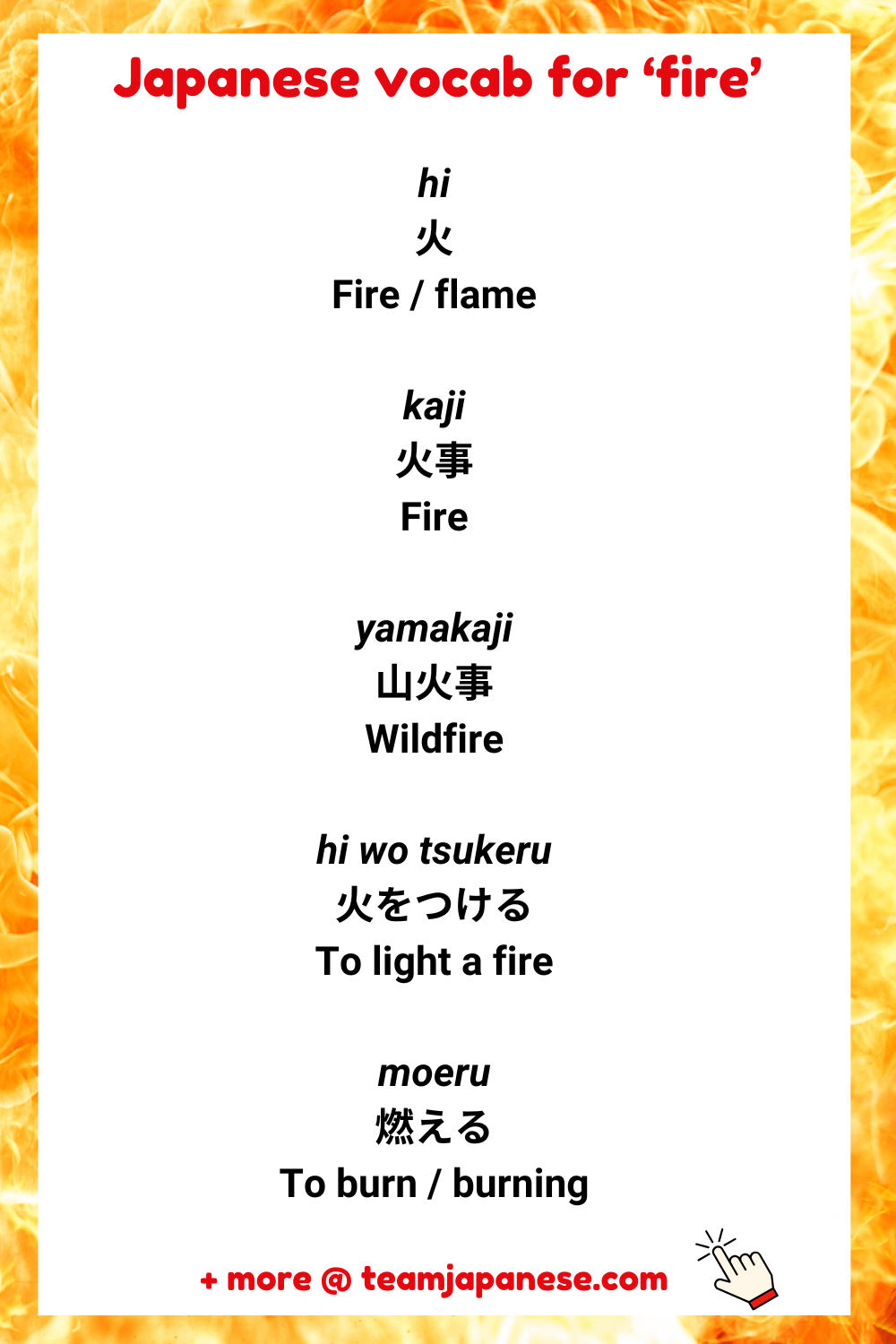Fire is a force of nature in every culture, and Japan is no exception!
The main word for fire in Japanese is hi (火 / ひ). You will also come across the word kaji (火事 / かじ), which is used for a destructive blaze such as a house fire.
In Japanese, there are several words connected to fire, each with its own nuance and use.
In this post, we’ll look at the most important Japanese vocabulary related to fire – from the basic kanji hi (火 / ひ) to useful verbs, and more.
Main words for fire in Japanese
Hi
火
Fire / flame
火 is the kanji character used to represent ‘fire’ in Japanese. Its kunyomi or ‘Japanese’ reading is pronounced as hi (ひ) and is used to refer to ‘fire’ as a stand alone noun.
Meanwhile, the onyomi or ‘Chinese’ reading, ka (か) is generally used when 火 is part of a kanji compound word, such as kaji (火事 / かじ).
Hi is a general term for ‘fire’ which can be used to refer to a range of fire-related things such as candle flames, campfires and gas stove flames.
Example:
Hokkaido no fuyu wa samui no de, hi wo tsukeru
北海道の冬は寒いので、火をつける
ほっかいどのふゆはさむいので、ひをつける
Since the winter in Hokkaido is cold, we will light a fire.
Kaji
火事
Fire
Kaji is a compound term made up of the character 火, in conjunction with the character 事 which means ‘incident’, in this case.
In comparison to hi, kaji is the term applied to fire incidents or ‘conflagration’.
It pretty much describes fire where a fire shouldn’t be, e.g. a house fire.
Example:
Kinou, kinjo de kaji ga okotta
昨日、近所で火事が起こった
きのう、きんじょでかじがおこった
Yesterday, a fire broke out in the neighbourhood.
Yamakaji
山火事
Wildfire
When you add the kanji for ‘mountain’, yama (山 / やま), at the start of kaji you get yamakaji (山火事 / やまかじ).
Despite the fact that the kanji for ‘mountain’ is used, it can refer to any type of wildfire, whether or not it occurs on a mountain. For example, a forest or bush fire.
Fire-related verbs in Japanese
Hi wo tsukeru
To light a fire
火をつける
Hi wo tsukeru (火をつける / ひをつける) literally translates as ‘to turn on the fire’ and means igniting a fire. This can range from something as small as lighting up a cigarette, to lighting a house on fire.
Moeru
To burn / burning
燃える
After you have lit something, it will then be on fire and we can then use the verb ‘to burn’, moeru (燃える / もえる).
Example:
Uchi ga moeteiru
うちが燃えている
うちがもえている
My house is on fire
If something is flammable or burns easily you can use the phrase moeyasui (燃えやすい).
Example:
Kami wa moeyasui
紙は燃えやすい
かみはもえやすい
Paper burns easily
Kesu
To extinguish
消す
You may recognise kesu (消す / けす) to mean ‘erase’ or ‘turn off’ (the TV etc), though in this context it can also be used to refer to ‘putting out’ or ‘extinguishing’ a flame or fire.
Example:
Tabako wo keshite kudasai
タバコを消してください
たばこをけしてください
Please, put out your cigarette
Fire-related words in Japanese
Shoubou
消防
Fire fighting

‘Fire fighting’ in Japanese is shoubou (消防 / しょうぼう). Unlike its English counterpart, the kanji compound doesn’t contain the kanji itself for ‘fire’. Instead, a combination of the kanji for ‘extinguish’ 消 and ‘protect’ 防 are employed.
By adding on various characters such as ‘car’ 車 etc. you can spell other fire fighting related words:
| English | Kanji | Hiragana | Romaji |
| Fire station | 消防署 | しょうぼうしょ | shoubousho |
| Fireman | 消防士 | しょうぼうし | shouboushi |
| Firetruck | 消防車 | しょうぼうしゃ | shoubousha |
Shoukaki
消火器
Fire extinguisher
‘Fire extinguisher’ in Japanese is shoukaki (消火器 / しょうかき) which literally translates as ‘utensil to extinguish fire’! This is definitely a good word to know in the case of an emergency situation.
Kanen
可燃
Flammable
Kanen is a noun and no-adjective used to describe something ‘flammable’.
You can also use the verb ‘to burn’, (moeru) to mean ‘flammable’. These two terms are used interchangeably to refer to ‘combustible trash’ in Japan’s famously rigorous waste system.
So, if you see a bin or trash can with the words kanen gomi (可燃ごみ) or moeru gomi (燃えるごみ), you can go ahead and throw away anything that cannot be recycled but may be burned!
Hanabi
花火
Fireworks

One of my favourite words in Japanese is hanabi, which means ‘fireworks’! It is made up of the kanji for ‘flower’ and ‘fire’.
This term emphasises the beauty of a colourful firework show, as if it were a meadow of colourful fire flowers lighting up the night sky.
Kazan
火山
Volcano
Although fire and lava are indeed different things, I think this Japanese term is still fitting for today’s ‘fire’ theme. If you were to translate ‘volcano’ literally from Japanese it would be ‘fire mountain’, kazan (火山 / かざん).
Whoever named volcanoes in Japanese definitely went with the ‘say what you see’ approach!
Kayoubi
火曜日
Tuesday
‘Tuesday’ in Japanese is kayoubi (火曜日 / かようび) which we mentioned in our previous post about days of the week.
It is named after the planet mars, which is kasei (火星 / かせい) in Japanese. Perhaps due to its red colour, mars is regarded as a fiery planet in many Asian cultures.
Learn more Japanese
We hope you enjoyed learning this Japanese vocabulary about fire!
Which was your favourite word? Did any of them surprise you?
If you want to learn more simple, everyday Japanese, our top recommended online course is JapanesePod101.
Try it – it’s free!
JapanesePod101 is our top recommendation to learn Japanese online. We love the fun, current audio lessons and interactive online tools. Sign up for your free lifetime account and see for yourself!
Related posts


Hannah is a half Irish/half Japanese girl living in Ireland. Her love for Japan and the Japanese language led her to studying languages and translation in university where she specialised in Japanese. She spent a year studying abroad at Rikkyo University in Tokyo. In her free time, Hannah enjoys using her sewing machine to upcycle clothes and create new pieces!

